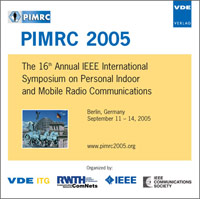Applicability of UDP-Lite for Voice over IP in UMTS Networks
Konferenz: PIMRC 2005 - 16th Annual IEEE International Symposium on Personal Indoor and Mobile Radio Communications
11.09.2005 - 14.09.2005 in Berlin, Germany
Tagungsband: PIMRC 2005
Seiten: 5Sprache: EnglischTyp: PDF
Persönliche VDE-Mitglieder erhalten auf diesen Artikel 10% Rabatt
Autoren:
Mertz, Frank; Engelke, Ulrich; Vary, Peter (RWTH Aachen University, Institute of Communication, Systems and Data Processing (IND), 52056 Aachen, Germany)
Taddei, Hervé; Varga, Imre (Siemens AG Com MD, Haidenauplatz 1, 81675 Munich, Germany)
Inhalt:
This paper examines the application of UDP-Lite for unequal error detection in packet-switched speech transmission via Internet protocols (Voice-over-IP) over UMTS radio channels. Traditionally, UDP is used as transport layer protocol, which contains a checksum that covers the complete packet. Thus, any packet with residual bit errors is discarded. Speech codecs like AMR, however, can tolerate bit errors in less sensitive parts of the bitstream. A more recent development, UDP-Lite, provides unequal error detection with a partial checksum that covers only the sensitive parts of a packet. Thus, only packets with errors in important bits are discarded. We compare the use of UDP-Lite for UMTS channels with convolutional and channels with Turbo coding. The results show that the achievable quality improvement by applying UDP-Lite depends on the residual bit error distribution of the chosen UMTS channel coding method. While we determined a quality improvement for channels with convolutional coding, we did not get an improvement for Turbo coding. Furthermore, when combined with header compression, the convolutional coder with use of UDP-Lite can reach the performance of the Turbo coder with use of UDP.


